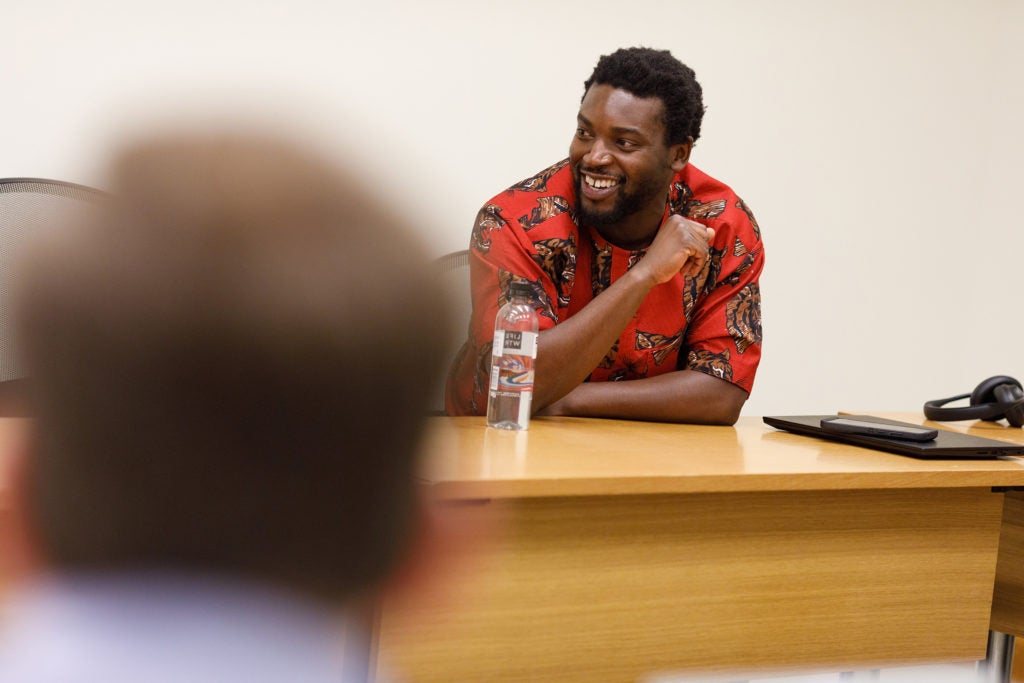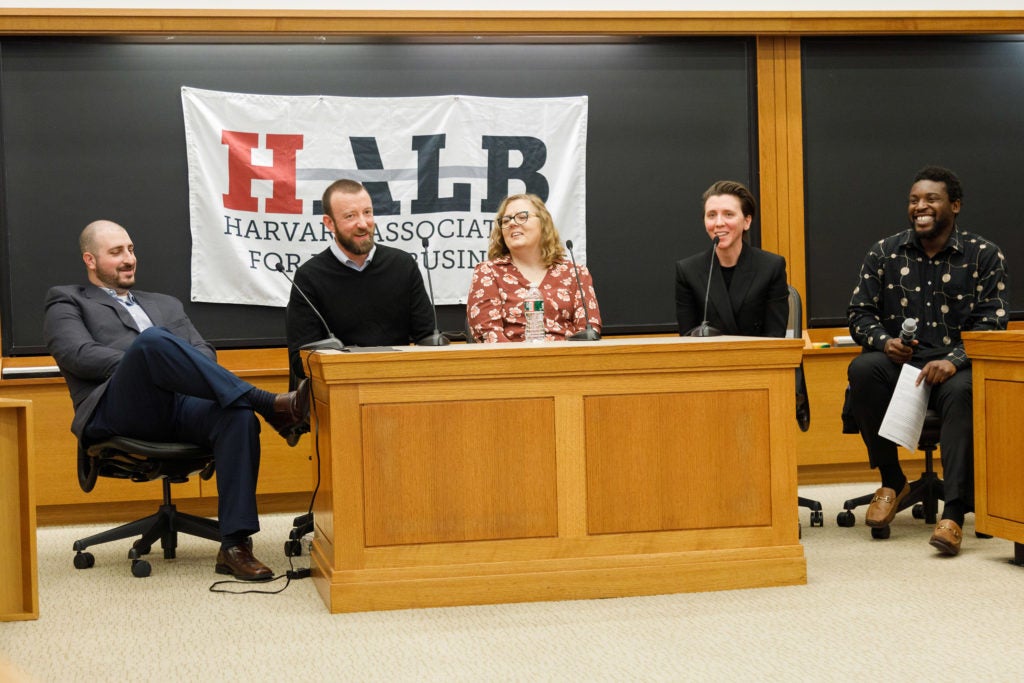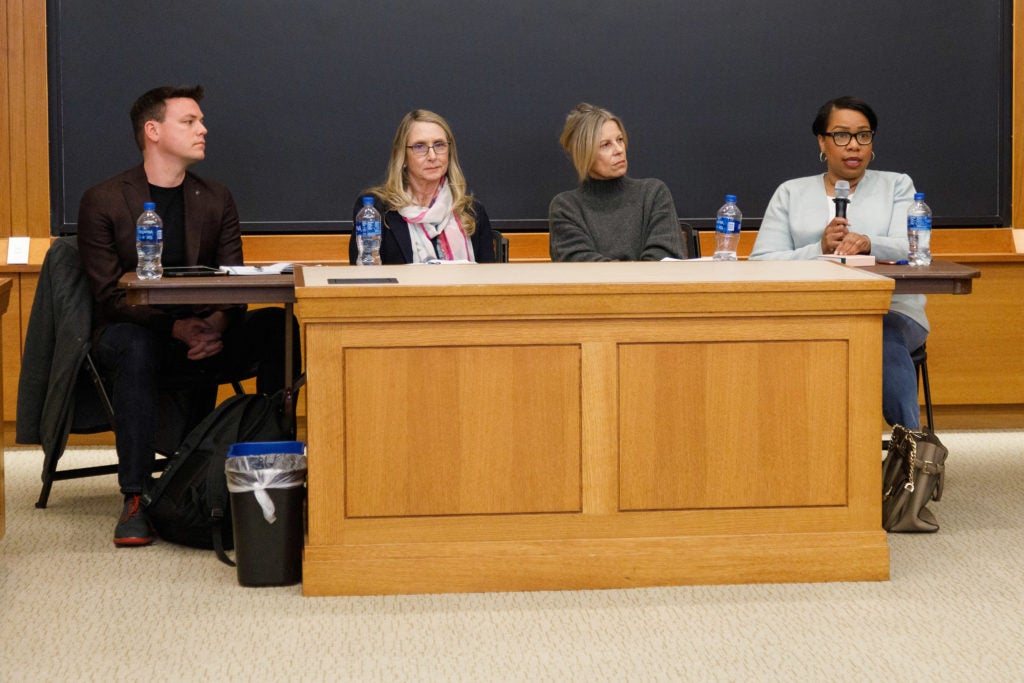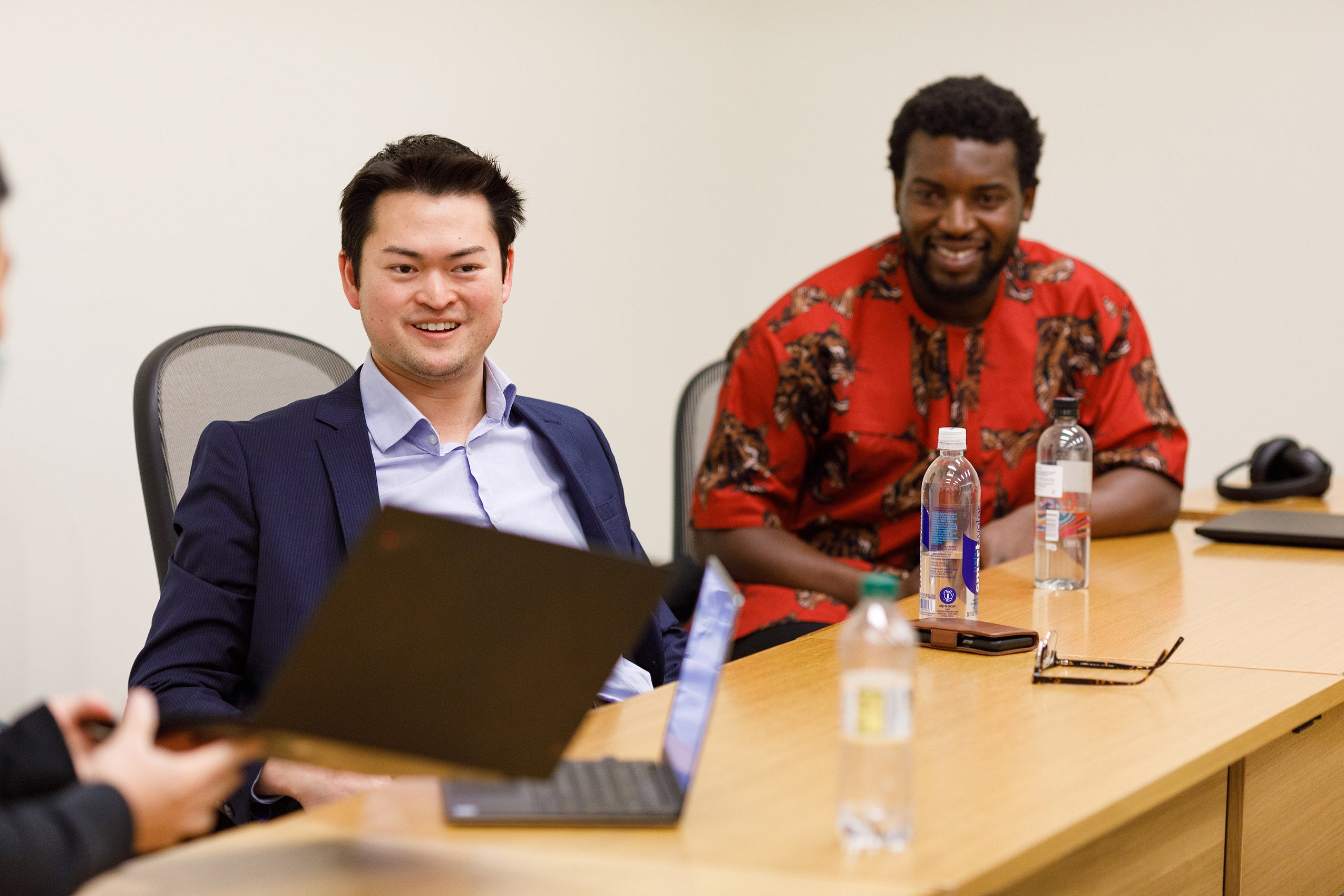A legal education can be the key to unlocking entrepreneurship, say the Harvard Law School graduates who created Evisort, a contract management platform driven by artificial intelligence.
“We never took the bar. We went straight to Silicon Valley. From five folks on a whiteboard, now we have 160 employees,” said Memme Onwudiwe ’19 who serves as Evisort’s executive vice president of legal and business intelligence. “We saw that it is a path that we want to open up to more folks.”
Evisort was founded in 2016 — while both were still in law school — by then Harvard Law Students Jerry Ting ’18, Jacob Sussman ’18, Memme Onwudiwe ’19 and Riley Hawkins ’19 with data scientists from MIT. This year, Onwudiwe and Ting returned to Harvard to share what they’ve learned both about launching startups and how their specialty — legal technology — is changing the profession.

Memme Onwudiwe ’19 is executive vice president of legal and business intelligence for Evisort.
On March 29, they welcomed a dozen students gathered around the seminar table to Startup Entrepreneurship and Innovations in Legal Technology, the second day of the intensive six-day reading group on the Harvard Law School campus. Following a panel discussion and podcast earlier that day, the two-hour class progressed from a lecture into a discussion, with the day’s four guests — legal operations executives from a range of industries — sharing their real-life experiences as pioneers in this rapidly changing field.
“The idea was basically to go back and teach folks about startup entrepreneurship and innovations in legal technology,” Onwudiwe said. “We wanted to show students how to be entrepreneurs.”
His business partner and co-lecturer, Ting, agreed.
“Our message to students is you don’t have to have an MBA to start a company,” added Ting, Evisort’s CEO. What budding entrepreneurs do need, he said, is a road map.
“We never took the bar. We went straight to Silicon Valley.”
Memme Onwudiwe ’19
“There’s no way that we could have done this without help,” Ting explained. He said that this class is a way to share that practical knowledge — part of what Ting called the “entrepreneurial ecosystem.” It also allows them to share both the tools they acquired working with the Harvard Innovation Lab and the leads they uncovered through sheer determination.
“We were like crazy people,” recalled Ting. “We went around cold-calling professors to help us. We didn’t know where to go, and so part of the idea here is if anybody on campus wants to do something entrepreneurial, we can break down the journey to certain steps.”
That practical know-how is already helping Deven Hurt ’23. His startup company Prediction Strike is essentially a fantasy sports stock market, allowing users to buy and sell shares of professional athletes as if they were stocks. The company, which launched publicly in 2019, currently has about 58,000 users, who have completed more than $12 million in transactions.
“We’re still early stage,” said Hurt. For him, the questions are simple: “Can I get users? How do I build this into a true sustainable business?” Although Evisort is much more advanced, he knows Onwudiwe and Ting have already faced these questions. “Because they’ve seen it all, everything that they’ve taught us is so helpful,” he said.
Hurt is particularly conscious of the value of these lessons because he’s had “two or three” startup ventures fail. A bioengineering major as a Harvard undergrad, he and his business partner had attempted to launch several medical technology companies. “Something that we talked about in this course was identifying customers, speaking to customers super early on, finding out if they would buy what you’re selling, getting out an early version, and figuring out if it sticks.”
In those first ventures, Hurt and his partner ignored those steps. “We spent a lot of time building in a silo. We didn’t do enough customer interviews to even find out that this was not what we should be building.” If he’d taken this course, he noted, “I don’t know if it would’ve saved those companies. It would’ve saved my time.”

On April 6, Lecturer Memme Onwudiwe ’19 (right) welcomed leaders in legal operations from Netflix, Microsoft, BNY Mellon, and Otsuka Pharmaceutical to campus for a panel discussion on innovations in legal technology as part of his course and for a panel discussion hosted by the Harvard Association for Law and Business (HALB). The HALB event also included panelists Renny Hwang ’05, Google’s director of litigation and Tony West, Uber’s chief legal officer.

On March 29, the Harvard Law and Business hosted a panel discussion with Tom Stephenson, director of legal operations at Credit Karma; Connie Brenton, vice president of law, technology and operations at NetApp, Inc.; Carol Hopperton, head of legal operations at Vonage; and Bianca Weber, legal affairs operations manager at Otsuka Pharmaceutical Companies. Several of the panelists were guest speakers in the Startup Entrepreneurship and Innovations in Legal Technology reading group.
This time, he’s taking notes. “There are a lot of operational things that I know I’m going to have to do one day.” Term sheets, for example, which the guest speakers had discussed in detail: “What you need to watch out for, what you need to be careful of.”
“Being able to sit in a small seminar and learn with and from other students who have the same interests and also have two lecturers who are people who have done it — that’s phenomenal,” said Hurt. “That’s about as real as it gets.”
The course’s other focus — on legal technology — highlights how the profession is changing. To share this vision, in addition to their class Onwudiwe and Ting helped organize guest speakers for student-run organizations like the Harvard Association for Law and Business and the Harvard Legal Technology Symposium. “What excites us is that, in addition to a class, for two weeks the center of the legal technology and legal innovation world will be Harvard Law School,” said Onwudiwe.
“Our message to students is you don’t have to have an MBA to start a company.”
Jerry Ting ’18
This matters because innovations like Evisort are only part of a larger change in the field. Increasingly, explained Onwudiwe and Ting, legal operations are running more like businesses, with alternative legal service providers (ALSP) and technology taking on more of the mundane duties.
“We’re actually seeing the role of the lawyer change,” said Ting. Evisort, for example, organizes a firm’s contracts, transforming them into a mine-able database and transforming the role of the lawyer, as well. “Instead of being the person who has to read the document, the lawyer is actually accelerating the deal,” said Ting. “That frees up the lawyer to be more of a general counsel. It elevates the lawyer to be a businessperson.”
That change is what brought Genevieve Antono ’21 to this class. “In the traditional law school curriculum, you don’t think about a lot about big-picture trends,” said Antono. “But this is where the profession is going.”
“Even if you are going into a big law firm, if your clients are procuring services from startups. or if they are investing in legal operations, these are factors you need to think about,” she said. In class, she had referred to a summer placement where lawyers were “asking for technology that didn’t exist yet.”
“Law firms are under a lot of pressure to change and evolve,” she said. “If you are not cognizant of the industry trends, you’ll be in trouble.”
“This class takes a lot of the trends that I’ve been hearing about and makes it a bit more concrete for me,” said Antono. “I’m actually meeting the people and hearing about the issues firsthand from them in terms of how it ties into my traditional legal education.
“That world has changed,” she added. “Law students need to take more ownership over their learning and the trajectory of trends in the industry. We have to be curious and take classes like this one that are pushing the boundaries.”
